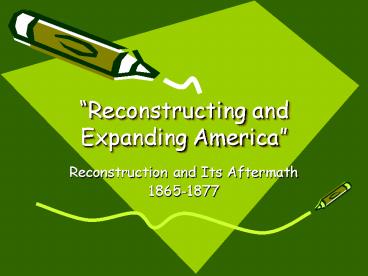Reconstructing and Expanding America - PowerPoint PPT Presentation
1 / 13
Title:
Reconstructing and Expanding America
Description:
Who were the southern politicians who claimed that the ... The Emancipation Proclamation. 1863. The Emancipation Proclamation in 1863 freed African ... – PowerPoint PPT presentation
Number of Views:52
Avg rating:3.0/5.0
Title: Reconstructing and Expanding America
1
Reconstructing and Expanding America
- Reconstruction and Its Aftermath
- 1865-1877
2
Focus Question
- Who were the southern politicians who claimed
that the states were not morally bound by postwar
constitutional amendments and so could restrict
the rights of the freed slaves. - A- Carpetbaggers
- B- Radicals
- C- Scalawags
- D- Redeemers
3
Background
- Reconstruction of America following the Civil
War was extremely difficult for Southerners
whereas the Northerners where able to rebuild and
begin The new America. The North and the South
could not agree upon major issues such as race,
government, politics, and what role women would
play in society before the war occurred, and not
much had changed after the war ended. The Civil
War carried vast consequences for the nations
future. - During reconstruction former slaves and many
small white farmers became trapped in a new
system of economic exploitation known as
sharecropping in exchange for land, a cabin, and
supplies. High interest rates charged for goods
bought on credit transformed sharecropping into a
system of economic dependency and poverty.
4
War Goals
- South War Goals were to become a independent and
sovereign Country. - North War Goals were to bring the 13 states that
succeeded back into the Union.
5
Effects felt by the North South
- The South lost 2/3 of their shipping industry,
railroads, and 1/3 of all livestock. People were
heavily in debt, courts were not functional. 20
of the militaries aged men were killed, 8
decline in the black population. The south who
were the leaders of the cotton industry had found
itself in despair. The southern society was
greatly disrupted. - The North society began to boom. The steel and
textile industry was producing twice as much as
the South. The North had a greater death toll
than the South despite those lost, the North
population began to grow and flourish. - Southern blacks were free
- Southern whites went through class conflicts.
- Southerners paid others to fight in the war on
their behalf - Southerners had argued that blacks were inferior.
6
Presidential Reconstruction1863
- President Lincoln indicates his post war policy
whereby rebel states regain their legal standing
when 10 of its voters swear allegiance to the
Union and accept the end to slavery. This was
Lincolns way of a quick, non-punitive
presidential reconstruction.
7
President Lincolns Death
- 1865 President Lincoln is assassin. Lincoln did
not have a plan for reconstruction after his
death, so when he dies all his plans for American
dies with him.
8
President Johnson1865
- President Johnson did not share the views of
Lincoln. Johnson plan was to remove all rights of
blacks, including voting. President Johnson was
extremely racist, didnt like the North or
Plantation owners. The confederate states
received full rights under the Johnson plan. The
North became extremely concerned with Johnsons
plan. The North began a radical reconstruction.
Johnson was led by a group of southern redeemers
who felt that the states were not bound by
postwar constitutional amendments and so could
restrict the rights of the freed slaves.
9
The Emancipation Proclamation1863
- The Emancipation Proclamation in 1863 freed
African Americans in rebel states, and after the
Civil War, the 13th Amendment emancipated all
U.S. slaves wherever they were. As a result, the
mass of southern blacks now faced the difficulty
Northern blacks had confronted --- that of a free
people surrounded by many hostile whites. - After the Civil War, with the protection of the
13th, 14th, and 15th amendments to the
constitution and the Civil Rights Act of 1866,
African Americans enjoyed a period when they were
allowed to vote, actively participate in
political process, acquire the land of former
owners, seek their own employment, and use public
accommodations.
10
Unraveling Reconstruction1865
- KKK- Pulaski Tennessee
- Started out as a social fraternity
- 1866-1867 becomes extremely violent
- Nathan Bedford Forrest reorganized the KKK to a
military form. - 1871 Congress held hearings on the Klan and
passed a tough anti-Klan law modeled after a
North Carolina statute. - 1870s white southerners had retaken control of
most Southern state government and didnt need
the Klan as much as before. - White Southern Democrats won elections easily,
and passed laws taking away many rights that
blacks had won during Reconstruction.
11
Freedmens Bureau1865
- Program that congress set up to assist newly
freed African- Americans by providing food,
medical care, and help with resettlement. The
Freedmens Bureau most notable task was the
development of over 1000 schools which trained
African Americans with an adequate education. The
Bureau ran out of funds shortly after and was
unable to prevent the emergence of Black Codes.
The Bureau was terminated in 1872.
12
Results of Reconstruction
- The result was a system of segregation which was
the law of the land for more than 80 years. This
system was called separate but equal, which was
half true- everything was separate, but nothing
was equal.
13
The End of Part I
- Topics to be discussed later in Part II.
- 1. Civil Rights Movement
- 2. The role the North played after Johnsons
reconstruction plan - 3. Grant Administration
- 4. 1876 Election corruption Hayes (VS) Tilden































